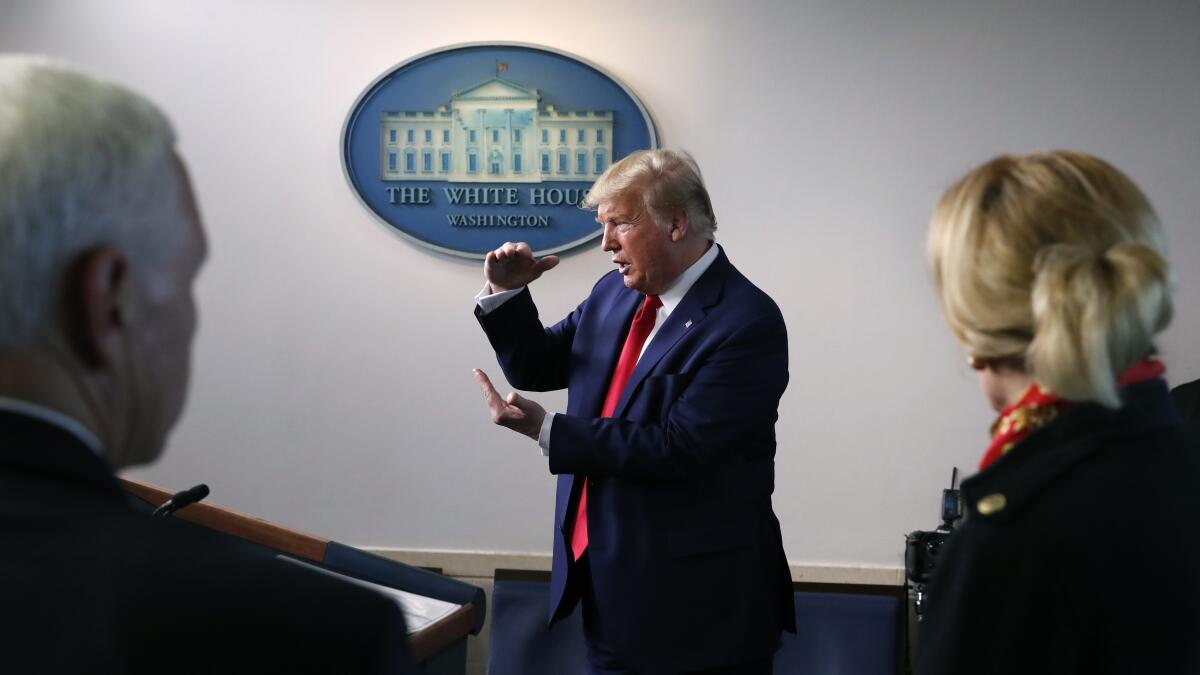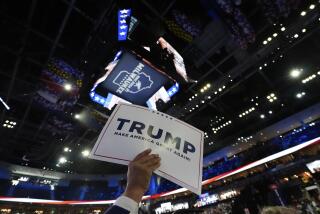Most wartime presidents win bipartisan support. Not Trump.

- Share via
WASHINGTON — President Trump has declared himself a “wartime president,” and he’s waging his reelection campaign the way any wartime president would: He’s using the advantages of incumbency to show himself in command of the coronavirus crisis.
He stages daily briefings on television where aides and business leaders praise his leadership.
He flew to Norfolk, Va., to see a Navy hospital ship off to New York City, a presidential journey that wasn’t essential but produced great visuals.
His campaign has flooded supporters with messages and videos showcasing his decisions and deriding his opponents.
And he’s offered soaring rhetoric, at times, to bind a frightened nation together.
“We’re all in this together, all of us,” Trump said Sunday. “The unity, the esprit de corps, the spirit — I’ve never seen anything like it. It’s a beautiful thing to watch.”
Only it’s not working very well — at least from the standpoint of rallying support for Trump’s reelection.
In public opinion polls, most Americans say they think the president is doing a good job of fighting the pandemic, especially since he launched a more energetic federal effort two weeks ago.
But that hasn’t produced a significant surge in his popularity — or his chances of winning in November.
The percentage of Americans who say they approve of Trump’s overall performance as president has inched up roughly 3% in the last month, to an average of about 47% in major polls. That‘s a high point for his presidency, but it’s still short of 50%.
Polls testing Trump against Joe Biden, the presumptive Democratic nominee, have all found the former vice president ahead by varying margins.
An ABC News/Washington Post poll showed Biden ahead of Trump 49% to 47%. A Fox News Poll showed Biden up by a more impressive 49% to 40%.
A wartime president should be in better shape — especially in Trump’s case, since he’s effectively running unopposed.
While Trump dominates the nation’s TV screens as much as two hours a day, Biden has been reduced to interviews from a makeshift studio in the basement of his Delaware home.
Trump’s numbers are especially unimpressive given that public support for a president usually soars in a national crisis or other major event, the so-called rally-’round-the-flag effect.
After terrorists attacked America on Sept. 11, 2001, President George W. Bush’s approval rating jumped 39%. And after Navy SEALS killed Osama bin Laden in 2011, a more partisan era, President Obama’s approval rating rose 8%.
Although both presidents saw their approval figures subsequently drop, both won reelection.
Trump’s 3% bump doesn’t measure up, although it clearly can change between now and November.
What’s holding Trump back? He’s figured out the stagecraft, but not the content.
Scholars say the “rally” effect kicks in when a president tries to act as a bipartisan leader, and wins some measure of support from the opposition party.
That’s not happening. Trump hasn’t stopped insulting Democratic leaders, including “Sleepy Joe” Biden and “Cryin’ Chuck” Schumer, the Senate minority leader. Trump and House Speaker Nancy Pelosi haven’t spoken for months.
When a near-unanimous Congress passed a record $2-trillion economic rescue bill, the president didn’t invite Democratic leaders to the White House signing ceremony.
He’s derided Democratic governors who complained about the administration’s failure to help obtain critically needed medical supplies, saying they weren’t “appreciative” enough, and suggesting he would penalize their states.
He’s continued his war on the news media, accusing reporters of spreading “fake news” when they asked him about his own claims, a month ago, that coronavirus cases would likely drop to zero in a couple of days. On Tuesday, 794 Americans died from the virus — and that death toll is certain to grow in the days and weeks ahead.
And he’s taken time out from managing the crisis to crow about his television ratings — “Bachelor finale, Monday Night Football type numbers,” he tweeted last week.
In other words, he’s still the same polarizing, combative, self-obsessed Donald Trump. He’s learned nothing from the biggest crisis of his presidency.
That’s had two political consequences. It’s left Biden and other Democratic politicians free to criticize his actions on the crisis — something they might otherwise hesitate to do.
And it’s reminded voters in the middle — the Democrats and independents who are glad the president is finally focused on the crisis — of all the Trump qualities they never liked. The president hasn’t done much to appeal to them, a missed opportunity.
Trump still has time to change. Poll numbers now won’t matter when voters cast ballots seven months from now.
What will matter is whether the pandemic has been quelled, and whether the now-collapsing economy is clearly recovering — or the nation is stuck in a deep recession, with millions still out of work, and voters hold Trump responsible.
Trump won’t escape a serious debate over what he did right and what he did wrong. His choice to wage partisan combat instead of bipartisan cooperation has guaranteed that — and probably made his path to reelection more difficult.
More to Read
Get the L.A. Times Politics newsletter
Deeply reported insights into legislation, politics and policy from Sacramento, Washington and beyond. In your inbox twice per week.
You may occasionally receive promotional content from the Los Angeles Times.











